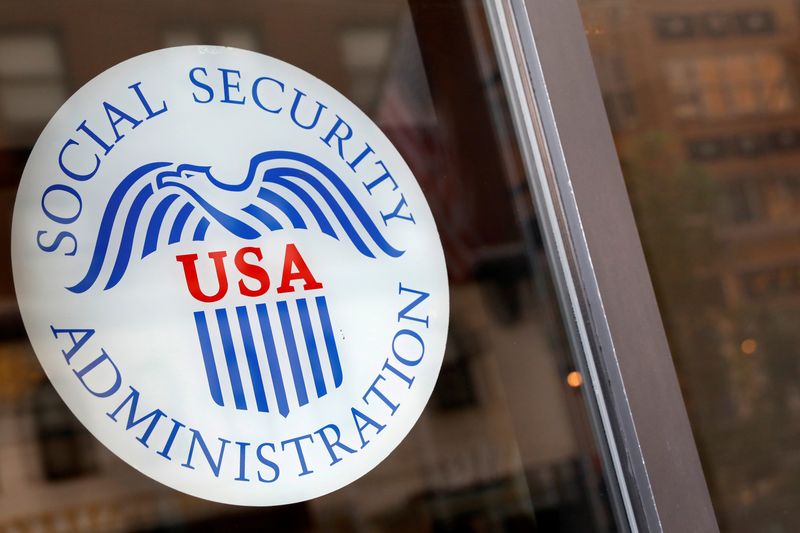[ad_1]

By Mark Miller
(Reuters) – What if the normal knowledge on how you can repair Social Safety now not holds?
The trustees who oversee this system issued their annual monetary forecast on Monday, predicting that the mixed retirement and incapacity belief fund reserves will probably be depleted in 2035 – one yr later than forecast final yr. The development is because of the latest sturdy financial system and wage progress, which has accelerated payroll tax funds that fund this system. Nonetheless, in 2035, this system could be bancrupt.
That will sound like Social Safety can have no cash in any respect to pay advantages in 2035. However what the report actually means is that the large Social Safety belief fund reserves – at the moment $2.78 trillion – could be depleted, and this system could be bringing in sufficient money at that time to pay solely 83% of the advantages promised to present and future beneficiaries. That will be the equal of a 17% minimize in advantages.
A profit minimize of that magnitude is extraordinarily unlikely. It will pose a right away and extreme hardship for retirees and disabled individuals, and it’s troublesome to think about any member of Congress prepared to clarify such an end result to constituents.
Conventional knowledge holds that there are only a few methods to resolve the issue: We will elevate the payroll taxes that fund this system, minimize advantages, or do some mixture of two.
However the nearer we get to insolvency, profit reductions can’t be carried out in a means that solves the quick downside. And a income answer will get tougher – at the least, if the purpose is to satisfy Social Safety’s authorized requirement to forecast solvency over a 75-year interval. The payroll tax hikes required on the level of insolvency to satisfy that purpose could be so massive that they probably wouldn’t be politically possible.
take away advertisements
.
Polling has lengthy indicated that the general public helps increased taxes as a approach to maintain Social Safety solvent and preserve profit ranges.
Democrats – together with President Joe Biden – help elevating taxes on the rich to revive solvency. Additionally they suggest elevating advantages modestly. Republicans in Congress oppose increased taxes, and have supported profit cuts by way of increased retirement ages and means-testing. Donald Trump normally says he wouldn’t contact Social Safety, though he has talked about potential cuts to advantages and his advisers are contemplating cuts to payroll taxes. Leaving this system untouched isn’t a coverage answer, because it factors to the aforementioned 17% minimize in advantages.
If Democrats sweep the U.S. elections in November, a income answer is feasible, mentioned Nancy Altman, president of Social Safety Works, a progressive advocacy group pushing for growth. “If Democrats run this fall on increasing Social Safety and win on that subject, they will push for it and drive votes.”
Martin O’Malley, the not too long ago confirmed commissioner of Social Safety, is optimistic {that a} answer will probably be reached. “I’ve met with a whole lot of members of Congress, and my sense is that nobody is especially desperate to play hen with a program that’s this essential to so many seniors and folks with disabilities,” he informed me in an interview on Monday.
But when gridlock persists on this subject, Congress would possibly properly flip to a unique answer to avert insolvency and profit cuts: an emergency injection of common authorities income.
“Should you had requested me 20 years in the past, I’d have predicted a solvency answer that leaves the present system intact, however I now not suppose that may occur,” mentioned Charles Blahous, who served as one of many two public trustees for Social Safety and Medicare from 2010 to 2015. A conservative, he now researches retirement safety points at George Mason College. “However barring a political miracle and a whole lot of management, I now suppose we’re headed towards a common income bailout.”
take away advertisements
.
That will be a profound turning level for Social Safety, which has all the time been self-financed. This system is funded primarily by the payroll tax, at the moment 12.4%, which is cut up evenly by staff and employers. It is usually funded by smaller quantities of income from curiosity earned on belief fund bonds and taxation of advantages.
HOW THE MATH WORKS
The logic backing the final income answer is easy. Even when consensus emerged for some quantity of profit discount near the insolvency date, the maths merely doesn’t work because of the magnitude and timing of the cuts required.
“You couldn’t implement a 25% minimize in a single day, as a result of it might have a horrible impact on the revenue of present beneficiaries,” mentioned Paul N. Van de Water, senior fellow on the Middle on Price range and Coverage Priorities, a progressive suppose tank. “And phasing in smaller cuts over an extended time frame doesn’t clear up the short-term downside.”
Including common income would imply that Social Safety – for the primary time – could be including to the nation’s debt burden, for the reason that cash could be borrowed. The shift additionally may put Social Safety in the identical boat as different federal applications topic to annual congressional appropriations for issues like meals and housing.
However Van de Water is extra sanguine concerning the implications of utilizing common income to fund this system. “Social Safety has turn out to be sufficiently well-liked and ingrained over time that it is not clear having some non-earmarked financing would diminish the power and help for this system all that a lot.”
take away advertisements
.
Sadly, this probably sport of brinkmanship will solely the troubles expressed by so many People about the way forward for Social Safety. In case you are amongst these worriers, Van de Water has some phrases of reassurance.
“Regardless of the uncertainty, it’s impossible that Congress would permit full advantages to not be paid for Social Safety,” he mentioned. “There could also be a whole lot of angst earlier than an answer is reached, simply as we’ve had angst on different funds points, however will probably be solved.”
The opinions expressed listed below are these of the creator, a columnist for Reuters
[ad_2]
Supply hyperlink









Leave a Reply